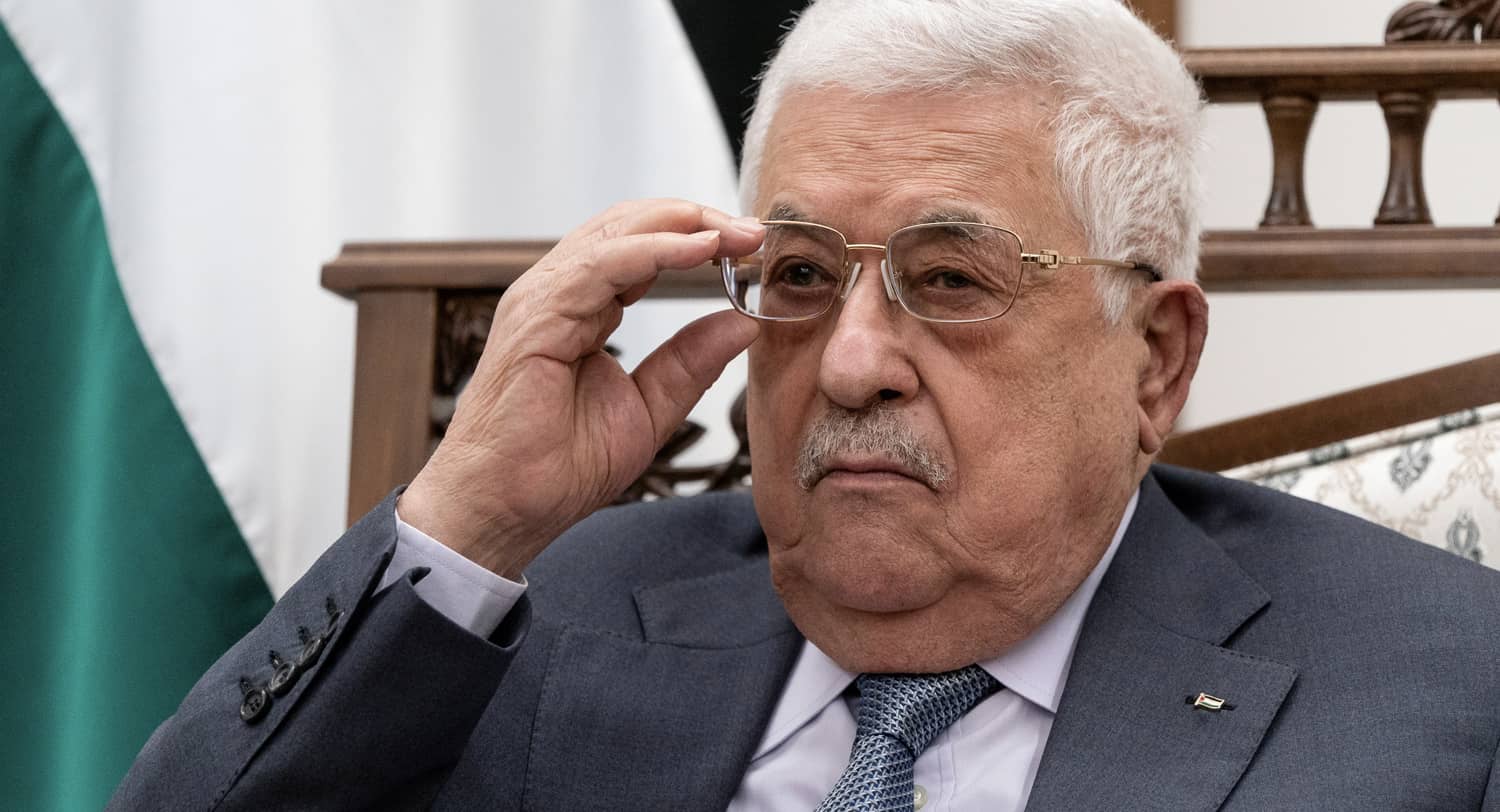On July 15, 2022, Mahmoud Abbas, president of the Palestinian Authority, was standing shoulder to shoulder with US President Joe Biden in Bethlehem. It was hard to hide the disappointment on Abbas’s face. Since the Oslo Peace Accords of 1993 he has met five US presidents. The first two—Bill Clinton and George W. Bush—were eager to engage in Palestinian–Israeli negotiations, but the last three presidents—Obama, Trump and now Biden—showed moderate to low interest in the Palestinian plight, as other critical matters drew away their attention.
>> A Profile in Policy: Read more from Ksenia Svetlova
If there were any high hopes back in early 2021 when Biden became the US president, not many are left now. Biden brought with him some funding for Palestinian hospitals in East Jerusalem and some practical steps important for the daily life of Palestinians, such as the upgrading of the cellular networks, longer working hours of the border crossing at Allenby Bridge, and Palestinian family unification in the West Bank. Biden’s political statements on Palestinian statehood, however, have been rather limited in scope, although they have repeated the trope of “two states based on the 1967 lines.” The US Consulate General in East Jerusalem remains closed as does the PLO office in Washington. After more than six decades of fighting and negotiating with Israel, this was a disappointment.
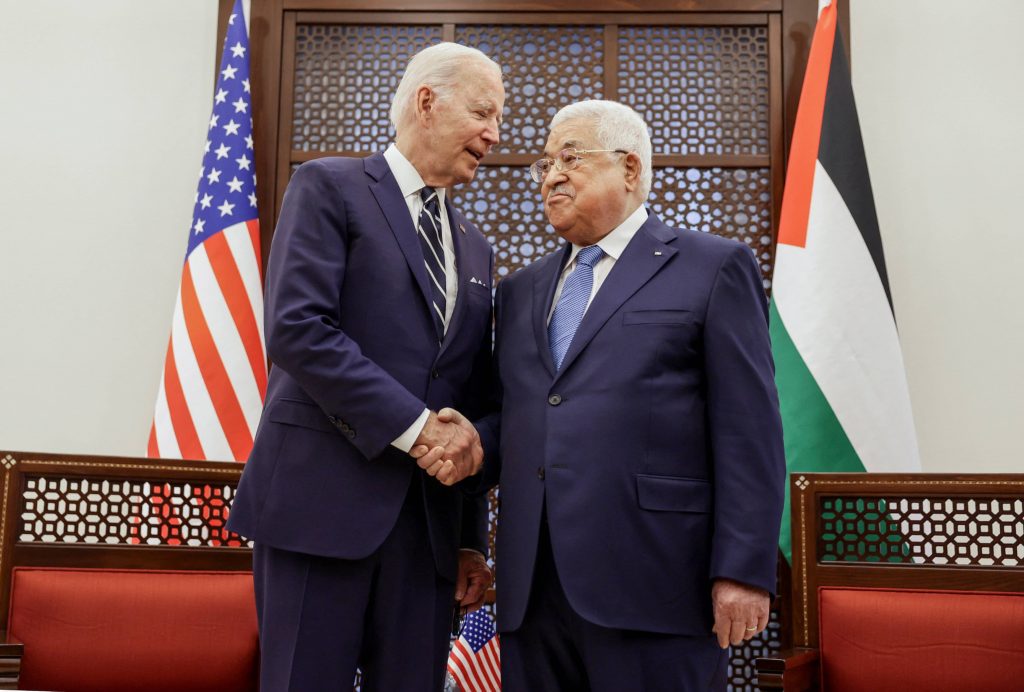
Throughout a lengthy political career that started with co-founding Fatah (the Palestinian National Liberation Movement) in 1959, Mahmoud Abbas experienced endless ups and downs. Together with Arafat, he switched from armed struggle to negotiations and coexistence. Unlike Arafat, he more wholeheartedly chose the latter, and back in 2002, he offered the sad insight that the Palestinians have defeated themselves through “militarization of the uprising” (‘askarat al-intifada). He was praised by the international community and by Israeli leaders as being “moderate and pragmatic,” invited to lead the Palestinian side in rounds of talks in 2007, 2010, and 2013–2014 but then was slammed as a “terrorist supporter” by the Netanyahu-led government in 2015. He was finally castigated by many Palestinians as a corrupt and incompetent leader who serves the occupation by providing for security cooperation with Israeli authorities. Did Palestinians and Israelis ever have a real chance with Abbas, one of the “founding fathers” of the Oslo Accords, at the helm? And if so, why was this chance lost? How will Abbas (also known as Abu Mazen or father of Mazen, after the name of his eldest son) be remembered, and who might succeed him as the head (or heads) of the Palestinian Authority?
A Palestinian Refugee, a Qatari Student, a Soviet PhD
Mahmoud Abbas was born in 1935 in the city of Safed in the Galilee. In 1948 his family joined hundreds of thousands of Palestinians who became refugees due to the war in Palestine. The family settled in Damascus, where he was admitted to university and graduated with a bachelor’s degree in law. In the late fifties he left for Qatar, where he became an official in the Ministry of Education and recruited teachers in the West Bank and Gaza to work in the Qatari education system. Had he not met a young civil engineer whose name was Mohammed Abdel Rahman Abdel Raouf al-Qudwa al-Husseini—i.e., Yasser Arafat—who at the time was living and working in Kuwait, Abbas might have continued his educational work in Qatar instead of becoming a senior Palestinian politician. The two men grew close, and soon Abbas became Arafat’s right hand man.
In the 1970s, Mahmoud Abbas became responsible for the financial affairs of the Palestinian Liberation Organization. In Israel there is a dispute as to whether he was a secret partner in the actions of the Black September group, which, among other atrocities, carried out the massacre of the Israeli athletes at the Munich Olympics in 1972. This is what Abu Daoud (Mohammed Daoud Odeh), one of the heads of Black September, claimed in his autobiography. Abbas has always denied his involvement.
In the late 1970s, Abbas was appointed PLO representative in Moscow, where he completed a doctorate at the Institute of Oriental Studies under the guidance of the head of the institute, Yevgeny Primakov, a close associate of the Communist Party Secretary General Leonid Brezhnev. The title of his doctoral thesis was “The connections between Zionism and Nazism between the years 1933–1945.” It stated that the two movements not only cooperated with each other during World War II but also had some common elements.
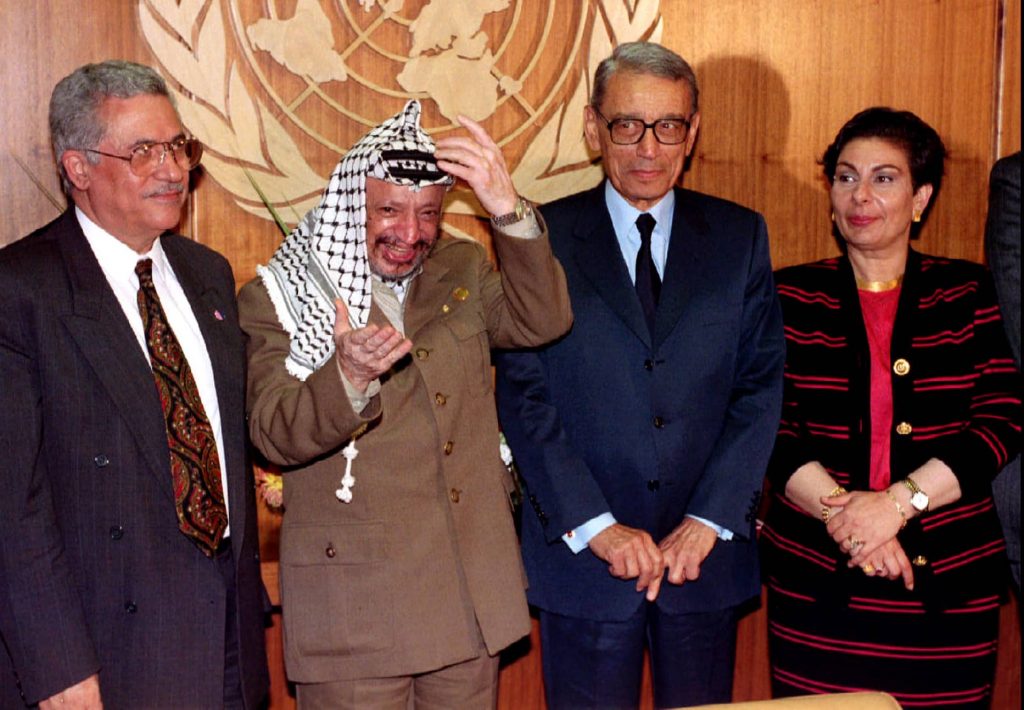
In 2001, when I was working at MEMRI (Middle East Media Research Institute), I went to Moscow to locate this work. After a quick search I found it in the archive of the Institute of Oriental Studies. The thesis was written in Russian, and every second sentence in it was some quote of Lenin. It was very much in line with the then official Soviet antisemitic claim that castigated Zionism as a “colonial vestige,” rather then as a genuine movement, and described it as a menace to the “indigenous Palestinian nation.” In 1984, Abbas’s book, based on his PhD, was published in Arabic in Syria, but it was very different in content and included denying the Holocaust. However, in his many TV appearances and interviews, including with me, he said that he never denied the Holocaust and believed that it was a heinous crime.
Indeed, what else did Abbas do while he was in Moscow? According to documents revealed by Vasili Mitrokhin, a former KGB man who defected to the West, Abbas’s name appeared on the list of KGB agents in Syria under the nickname “Krotov” (meaning “the mole”). The Palestinian Authority rejected this report in every way. Muhammed al-Madani, who is responsible for the Committee for Interaction with the Israeli Public, claimed that the ties between the Palestinians and the Soviet Union had always been close, and that there was no logic in this claim because Abbas was openly the head of Palestinian–Russian Friendship Association and never tried to hide this fact.
Great Expectations
Mahmoud Abbas was always considered to be a moderate among senior PLO officials, in regard to the use of violence and the prospect of negotiations with Israel. Already in 1977, he declared that he was not opposed to contacts with Israel and to peaceful resolution of the conflict, breaking away from the official PLO line that insisted on Israel’s annihilation.
Fifteen years later, Abbas became a top negotiator in the later stages of the Oslo Accords (initially led by his perennial rival in the leadership ranks, Ahmed Qurei, known as Abu Alaa) and co-authored with Yossi Beilin the secretive “Beilin–Abu Mazen” document. During all this time, Abbas consistently rejected the use of violence as part of the struggle against Israel. He believed that by resorting to violence Palestinians were only harming their own chances, and that violence would not lead to a breakthrough. Later, he even hinted, during a televised interview on Israel’s Channel 12, that he would not demand his right to his parents’ house in Safed. His words were interpreted by his many critics in the Palestinian leadership and in refugee camps across the Middle East as a readiness to give up the “right of return”—one of the Palestinians’ most hallowed slogans.
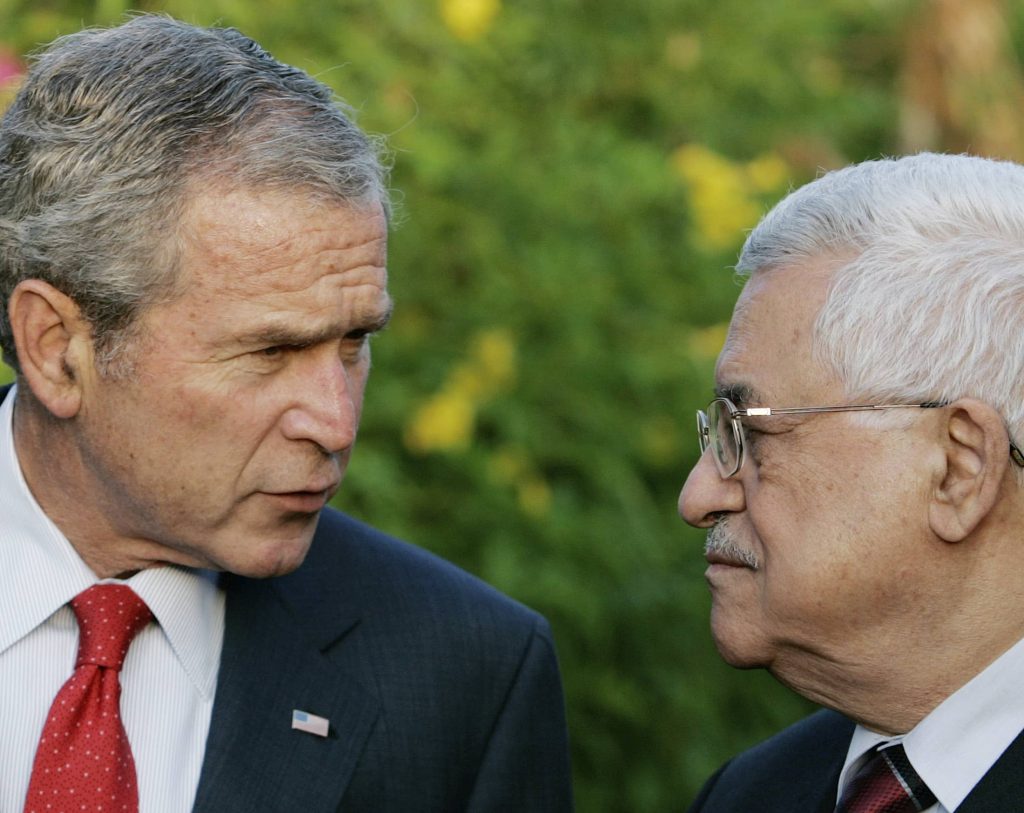
On February 11, 2005, I stood in the pouring rain in the Muqata’a—a government compound—in Ramallah, covering, as a journalist, the inauguration ceremony of a new Palestinian president. An eternal number two, he suddenly became number one. The world, especially the Israelis, and the Palestinians, expected a miracle; after the hellish years of the Second Intifada, Abbas was supposed to stop the violence and dismantle Palestinian armed groups. He was expected to revive what was left of the Palestinian economy, promote peace agreements with Israel, and protect Palestinian interests at the same time. In 2002, President George W. Bush had called for a “new and different” Palestinian leadership; Abbas was expected to fulfill this vision. Palestinians, meanwhile, wanted him to express a willingness to make major concessions for the sake of peace but to not give up on the fundamental issues, such as the right of return.
In just a few months after Abbas’s inauguration as president, Israeli prime minister Ariel Sharon accomplished the unilateral disengagement from the Gaza Strip. It was a necessary, yet extremely controversial move that almost tore Israeli society apart and was presented by Hamas leaders in Gaza as a victory. Hamas’s military parades and flags that colored Gaza in green that summer were a prelude to their landslide victory during the parliamentary elections in January 2006. Abbas, a pragmatic leader who wanted to avert violence, focus on reviving the Palestinian economy and on resuming negotiations, now had to rule over the Palestinian Authority with a Palestinian parliament dominated by a party that demanded Israel’s destruction.
The parliamentary elections in 2006 were observed by international monitors and described as “clean and transparent” but had brought about an unexpected and grim result. Fifteen months later, after an unsuccessful attempt to handle a unity government, Abbas decided to fire his prime minister, Hamas leader Ismael Haniya. Soon Hamas fighters were busy shooting Fatah activists in their kneecaps and taking over government buildings and crossings in Gaza. Since 2006, Abbas has not set foot in Gaza. From that very moment, his authority was undermined and compromised in the eyes of both Israelis and Palestinians. The loss of Gaza in 2006 also provided the Israeli political establishment with a question still posed to its voters: Why should Israel negotiate with a leader who is unable to exercise authority over his own people?
Between Chronic Weakness and Absolute Power
Despite the loss of Gaza, Abbas had successfully fulfilled the delicate and tricky task of dismantling the Al-Aqsa Martyrs’ Brigade—the military wing of Fatah—and by 2007 his team was back at the negotiation table. At the other side of the table was ex-Likud and then Kadima Party leader, Ehud Olmert. Some dramatic progress was made in narrowing the gaps; however, there was ultimately no breakthrough to boast about, and each side was wary of making significant decisions at a time of political uncertainty.
It is widely believed that Abbas had disappointed Olmert by his constant refusals and denials. No one knows, however, what the outcome of these negotiations would have been had Olmert not been under a legal cloud (he soon resigned and was tried and found guilty on counts of graft). Could Abbas have accepted and signed—on behalf of all Palestinians in the Palestinian Authority and the Palestinian diaspora—an agreement that would terminate the conflict and establish a Palestinian state, giving up the right of return and claims of sovereignty over the Al-Aqsa Mosque in Jerusalem, if he knew that Olmert would still be prime minister? Was Olmert’s offer, described by US Secretary of State Condoleezza Rice as “amazing” really appealing to the Palestinians? Rice mentioned at the time that “Rabin had been killed for offering far less,” but perhaps it was Abbas who was worried that he would be killed for accepting an offer that in the eyes of many Palestinians was still far from sufficient.
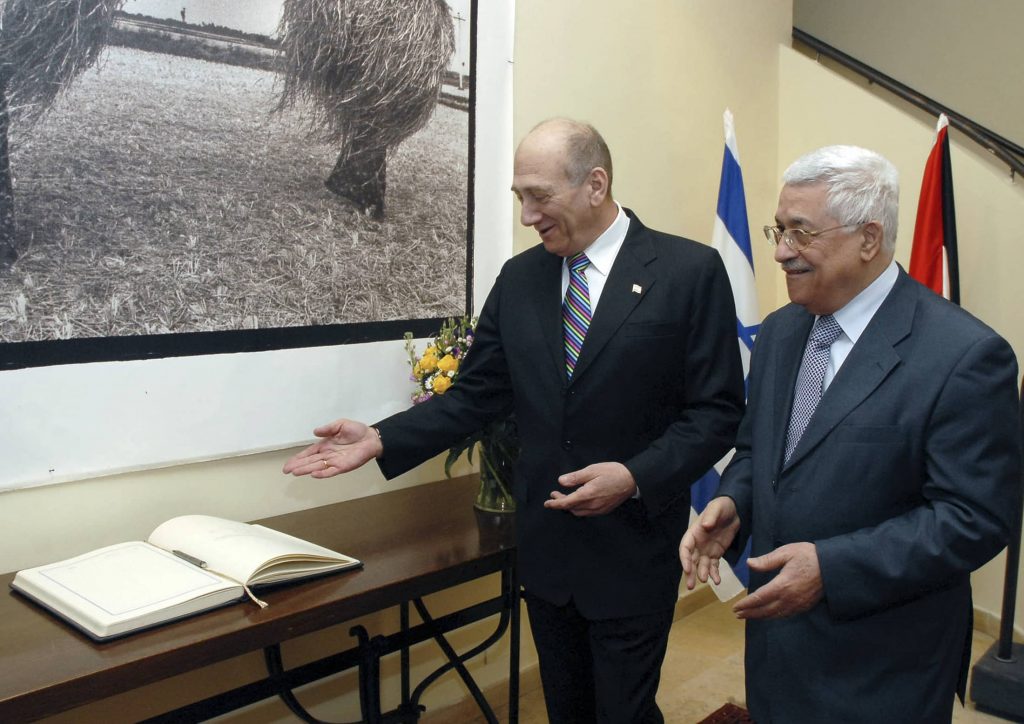
After Olmert left office, the negotiations stalled. Abbas tried fighting Israel in the UN and other international institutions—unsuccessfully. The lack of progress on the negotiations track, the divide between Gaza and West Bank, the Arab Spring, and the tremendous changes in intraregional relations, as well as growing authoritarianism in the Palestinian Authority, turned Abbas into an isolated, helpless leader, who exercises what is left of his power to prevent any reform and change in the West Bank. He had been weakened by 12 years of Netanyahu’s rule, when even the simplest steps, such as enlarging a certain residential quarter in Qalqilya or extending the working hours of some border crossing were impossible. And yet nothing can justify the vast corruption and nepotism that became a distinctive feature of the Palestinian Authority.
The bid to have elections by May 2021, the first in 15 years, was followed by the decision to postpone them indefinitely and resort to political repression. It was the last straw. The Palestinian street wants elections, political unity, and a firm position vis-à-vis Israel. In Abbas, who is keen to stick to the status quo, they see nothing other than weakness.
The Day After Abbas
For the last 17 years the Palestinian Authority, a ruling body that was meant to exist only for a few years and to serve a bridge to Palestinian statehood, has been led by Abbas. His own people currently see him as an ailing autocratic leader who did not promote their dream of independence, did not curb Israeli settlement activity, and did not succeed in economic development; in practice, he became “an official who serves Israel.” In contrast, the Israelis blame him for not being bold and daring enough to stop the incitement and payments for terrorists and for not offering enough of a compromise. Many have forgotten that he dismantled the Al-Aqsa Martyrs’ Brigade and essentially stopped the violent Second Intifada, that he always advocated for nonviolence, and that during the 17 years of his rule, the West Bank did not pose a military threat to Israel.
Although no peace was achieved, no war or intifada erupted either. Is it enough of an achievement for a leader of a political entity that was never free to make his own choices? Time will tell. Just like former president Hosni Mubarak in Egypt, Mahmoud Abbas has tried not to rock the boat too much. Just like Mubarak, he and his immediate environment are steeped in corruption and have become oblivious to the plight of the Palestinian people. After Abbas, some kind of a violent shake-up in the West Bank is seemingly inevitable. Just like other Arab leaders of his age, Abbas has not prepared an heir. He has meticulously destroyed and banned any cadre around him that seemed intelligent and ambitious. The battle for legacy and spheres of influence might be brutal and dangerous. Palestinian society will have to make some painful choices, and the Israelis will be faced with a new, post-Abbas reality.
When a brutal war is raging in Ukraine and the danger of famine is hanging over dozens of countries in Africa and the Middle East, it’s natural that the world is not focused on Israeli–Palestinian affairs. The only two parties that have to make sure that the nonviolent legacy of Abbas is not lost are the Palestinians and Israelis. They will have to work hard to prevent a violent outburst, to maintain the conditions that will still allow for a two-state reality, and to try to work out a solution. The last was, unfortunately, not accomplished during Abbas’s era.
